Stuart Aken's Blog, page 247
April 27, 2013
The Last Word, by Ben MacIntyre, Reviewed.
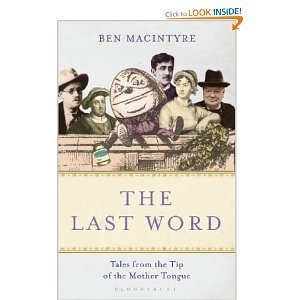 The Last Word, subtitled ‘Tales from the Tip of the Mother Tongue’, is a collection from the writings of Ben MacIntyre, a columnist writing about books for The Times.
The Last Word, subtitled ‘Tales from the Tip of the Mother Tongue’, is a collection from the writings of Ben MacIntyre, a columnist writing about books for The Times.If you’ve ever pondered the mysteries of military euphemisms, considered the last words of heroes, wondered at the geek-speak of the computer nerd, laughed at inadvertently skewed translations or been curious about almost anything else to do with words, there’s something here for you.
The author has collected, listened to, been sent by readers, and purloined from reviewers many examples of neologisms, epitaphs, mistranslations, vanished words, malapropisms and many other interesting, amusing or downright odd usages of the words we use (or not) in everyday language.
Split into short sections, so that the book can be picked up for even a couple of minutes at a time, the material is varied in content but not in quality. All of the 300 pages are presented in a style easy to read, well-written, and generally tinged with humour. There are a few exceptions, when serious issues are up for discussion. The odd personal anecdote sneaks in amongst the more general observations and tales and brings a more intimate feel to the book.
I was entertained, educated, startled, intrigued, surprised, moved, and made to laugh out loud as I read the different pieces. If you have any interest in language at all, and, as a reader and/or writer, you clearly must have, you’ll find this a worthwhile addition to your library. Not only do I heartily recommend the book, I place it on that short and vital list of those volumes I’d save from the burning house or take with me to that famous desert island.

Published on April 27, 2013 01:42
April 25, 2013
What Rules Do You Swear By as a Writer?
 Greengrocers' apostrophe 2 (Photo credit: Wikipedia)
Greengrocers' apostrophe 2 (Photo credit: Wikipedia)Writing, in common with most occupations, has rules. Society has rules. Games have rules. Do we always obey them? And does it matter whether we do or not?
Clearly, societal rules, often elevated to laws, are supposedly there to prevent chaos and injustice. The law that prevents the taking of life under most circumstances seems sensible for all concerned. The law that allows a company to take advantage of unsuspecting customers might appear a little less acceptable.
In games, rules stop the unscrupulous from overcoming opponents by cheating; or, at least, that’s the intention. Football (soccer, that is), of course, is the exception that proves the rule here.
With writing, however, the rules are made for a number of different purposes. Some are intended as general guidelines to enhance understanding. Some exist in order to standardise certain aspects of the process. Some have been invented to ensure that all but the most persistent will give up the idea of ever becoming a writer. And some are there to influence that most indefinable quality known as style.
Can any, some, none or all of these rules be broken without causing the end of the world to descend and obliterate the written word from existence? Well, I suspect one or two are rules we can, perhaps, bend a little. A few we might test to the extreme. And a small number can be ignored with impunity by those wise enough to recognise them for what they are.
There is a boring, but factually accurate, saying that suggests that all writers should learn the rules before they attempt to break them. If you break a rule in ignorance, you’ll probably remain unaware of your sin until one of the grammar, syntax, spelling or style police hands you a ticket and demands restitution. This, of course, means you are in danger of committing multiple instances of the same rule breaking. You are destined for disgrace and ignominy.
If, however, you break a rule in the full knowledge of the consequences, understanding that you are rebelling and may cause a frown on the face of the purist, you may just get away with it.
We all have our favourite rules; those we would never fail to obey. Perhaps they hold some special significance for us. Perhaps they’re the foundations upon which our own confidence in our writing is based. Perhaps they illustrate our skill. Or, perhaps, they don’t actually mean what we think they mean. What? You mean we may be obeying rules we could possibly break? And get away with it?
Before I invite you to participate and state your own particular rules that you feel deserve your loyalty, let me start the ball rolling with a few of my own. After all, it’s my post.
There’s a rule that states that, in presenting speech, the author should use only ‘he/she said’. Contentious, especially amongst newbies, this one. But there’s a good reason for this simple rule. It is that the tag ‘he said’ becomes ‘invisible’ after a very short while. It retains its purpose, in identifying the speaker, but it doesn’t intrude upon or interrupt the story. Yes, I know: you use ‘he expostulated’, ‘she swore’, ‘he shouted’, ‘she cried’ etc, etc, etc. The problem with such dialogue tags is that they should be unnecessary. The words and context should indicate the way in which a response is made. In most, though not all, cases, the how of the delivery is, or should be, evident by what is said and the situation in which it is spoken. There are, of course, circumstances in which the words alone may be insufficient to prevent ambiguity. Usually, the context will help here. But there are circumstances when, for example, sarcasm may not be evident or grief may be hidden. In these cases, if a description of the speaker does not fit the situation, it may be necessary to fall back on the more expressive attribution and tag the speech with a, ‘she giggled,’ ‘he smirked’, ‘she threatened, or ‘he winced’.
Of course, anyone familiar with my writing will know I rarely use dialogue tags at all. I rely on the words themselves to identify the speaker. Occasionally, I’ll toss in a name to keep the reader on track. Or I might attach the speech to an action so that the speaker is thus identified.
Another rule, this time an absolute, is one I’d never dream of breaking. In fact, in common with ninety per cent of the educated masses, I wince every time I see an instance of this rule in ruins. I mean, of course, the apostrophe; that simple piece of punctuation that’s so easily misunderstood by those who sell by the roadside, allowing them to advertise, ‘Potato’s for sale’, or ‘Pick your own Tomato’s’. Such a simple rule: if it’s a plural, the apostrophe is incorrect, wrong, bad, wicked and a hanging offence! If it is possible to reconstruct the phrase in such a way that possession forms part of the syntax, then, of course, the apostrophe is there to express that fact. ‘George sells his potatoes to the grocers, who place them on their carts.’ No possessives, so no apostrophe. But ‘George sells potatoes and places them on the grocers’ carts.’ Here, George performs a service to multiple grocers, each of whom possesses a cart on which he places the items he sells. Okay?
There is, of course, the other apostrophe ruling that’s constantly under attack by the ignorant: I speak of the difference between the possessive and use of contraction. ‘It’s on the floor’, which translates as ‘It is on the floor’ and, as a contraction, requires an apostrophe to indicate there is a letter missing. But ‘That’s on its own floor’, contracts ‘that is’ to ‘that’s’ and leaves the possessive ‘its’ alone to show that the floor belongs to it.
So, a few of my ‘favourite’ rules. You have your own. So, let’s have them. Those rules that make steam emerge from your ears every time you hear them broken, bring bulges of rage to your eyes each time you see them abused. Please feel free to express your loves here. In a future post I’ll look at rules we hate and examine a few of those.
PS. You'll note that the 'tags' below include an instance where an apostrophe would be applicable, but it is absent. Thsi is because in 'tags' the convention is to exclude punctuation to prevent confusion, apparently!
Related articles
 Punctuation Pet Peeves
Punctuation Pet Peeves
 Apostrophe ban council backs down and reinstates punctuation
Apostrophe ban council backs down and reinstates punctuation
 Apostrophe to Form Plural
Apostrophe to Form Plural
 England's Battle Over The Apostrophe
England's Battle Over The Apostrophe

Published on April 25, 2013 00:30
April 22, 2013
World #Book Night in UK and Ireland
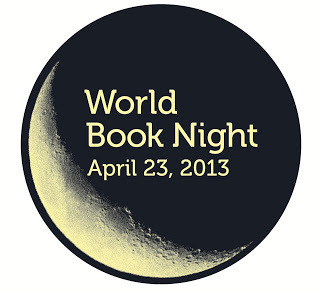 Tonight is World Book Night in the UK and Ireland. Below is a short extract from the website set up specifically to promote this event. As a writer and a reader, I want to do what I can to spread the word and help to get people reading, so this is my contribution, small as it is. If you’re a lover of books, writing and reading, please spread the word in any way you feel able.
Tonight is World Book Night in the UK and Ireland. Below is a short extract from the website set up specifically to promote this event. As a writer and a reader, I want to do what I can to spread the word and help to get people reading, so this is my contribution, small as it is. If you’re a lover of books, writing and reading, please spread the word in any way you feel able.http://www.worldbooknight.org/
World Book Night has the full backing of the Publishers Association, the Independent Publishers Guild, the Booksellers Association, The Association of Authors’ Agents, the Society of Authors, the Reading Agency and libraries across UK and Ireland.
There are many ways for the industry to be involved with World Book Night whether directly as one of the WBN titles or author recommend or by supporting our mission to spread the love of reading. The easiest way to get involved is to apply to be a giver. We welcome everyone who's passionate about books and reading - and who's more passionate than those who work in the industry? Click here to find out more and apply
Whether you're closely involved or not you can still help us spread the word by telling everyone in your network about World Book Night. Connect with us on social media using the buttons at the top of the page. Or use good old fashioned actual word of mouth!
World Book Night receives funding from publishers whose books are featured in World Book Night as well as donations from individuals, companies and trusts and foundations who share our passion for books and reading and value our work. Large scale industry donations have come from companies as varied as The Book People, Curtis Brown and Clays (St Ives). If you would like to support or work please make a donation here or alternatively contact us on info@worldbooknight.org
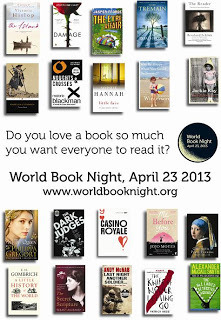 Please note that each year's World Book Night books are chosen independently so there is no opportunity for publishers, agents or authors to nominate books for inclusion. For a book to be considered for World Book Night it must be published in the UK in mass market paperback. Our criteria for choice is very broad but we do look for books or authors that are already popularly established as WBN wouldn't work if we were unable to find enough givers for each title
Please note that each year's World Book Night books are chosen independently so there is no opportunity for publishers, agents or authors to nominate books for inclusion. For a book to be considered for World Book Night it must be published in the UK in mass market paperback. Our criteria for choice is very broad but we do look for books or authors that are already popularly established as WBN wouldn't work if we were unable to find enough givers for each titleIf you want to become more closely involved or learn more about World Book Night please get in touch via info@worldbooknight.org
Related articles
 World Book Night is Almost Here!
World Book Night is Almost Here!
 World Book Night UK & Ireland 2013
World Book Night UK & Ireland 2013
 World Book Night: April 23rd 2013
World Book Night: April 23rd 2013

Published on April 22, 2013 16:30
April 18, 2013
Clichés Are the Dog’s Bollocks, Aren’t They?
 Cover of Stephen Fry
Cover of Stephen FryThe temptation, when writing about clichés, probably a cliché in itself, is to use clichés as an attempt at irony. I shall try to resist that temptation. But I’m not promising I’ll succeed.
First of all, what is a cliché? Well, the good old SOED, my particular favourite amongst dictionaries, gives the following definitions:Cliché: 1. A metal stereotype or electrotype block.2. A stereotyped expression, a hackneyed phrase or opinion; a stereotyped character, style, etc.
I think we can ignore the first, accepting it as the historical reason for the second, which is of far more literary interest. I’m not going to bother to list any clichés at this stage. I’m sure most of you can quote dozens, and if you’re looking for others, try this link: http://www.clichelist.net/
Secondly, let’s look at the question; are clichés always bad?They can be a shorthand method of expressing something that everybody’s likely to understand; a way of communicating an idea in a few words that will be readily appreciated. And, in journalism and common speech, such ways of communicating can be useful without necessarily suggesting any laziness on behalf of the communicator. If I say someone ‘abandoned ship’, I don’t need to explain, do I, assuming you understand this is a metaphorical rather than a literal statement? And if I call something ‘child’s play’, we all know that it’s easy, don’t we? So, in this way, clichés perform a valuable service.
However, in works of creative writing, whether fiction, fact, poetry or prose, clichés are generally considered bad things. Why? Well because they generally make the writer look lazy and they generally mean that the writer is lazy, has taken the road of least resistance (there you are, and I said I’d try to avoid it!).
 An 1870 oil painting by Ford Madox Brown depicting Romeo and Juliet's famous balcony scene (Photo credit: Wikipedia)The obvious thing about clichés is that they were once someone’s original solution to the problem of how to express something in a memorable and meaningful way. Many, of course, flowed from the pens of literary giants. Shakespeare comes to mind; ‘A rose by any other name…’ (Romeo and Juliet, if you didn’t know), ‘more fool you’ (Taming of the Shrew), ‘pound of flesh’ (Merchant of Venice) and ‘shuffle off this mortal coil’ (Hamlet – the famous soliloquy) are just a few of many. (if you’re interested, there’s a useful resource giving meanings and sources here: http://www.english-for-students.com/Phrases-from-Shakespeare.htmlStephen Fry famously once said, ‘It is a cliché that most clichés are true, but then like most clichés, that cliché is untrue.’And Harold Evans told us, ‘Attempting to get at truth means rejecting stereotypes and clichés.’
An 1870 oil painting by Ford Madox Brown depicting Romeo and Juliet's famous balcony scene (Photo credit: Wikipedia)The obvious thing about clichés is that they were once someone’s original solution to the problem of how to express something in a memorable and meaningful way. Many, of course, flowed from the pens of literary giants. Shakespeare comes to mind; ‘A rose by any other name…’ (Romeo and Juliet, if you didn’t know), ‘more fool you’ (Taming of the Shrew), ‘pound of flesh’ (Merchant of Venice) and ‘shuffle off this mortal coil’ (Hamlet – the famous soliloquy) are just a few of many. (if you’re interested, there’s a useful resource giving meanings and sources here: http://www.english-for-students.com/Phrases-from-Shakespeare.htmlStephen Fry famously once said, ‘It is a cliché that most clichés are true, but then like most clichés, that cliché is untrue.’And Harold Evans told us, ‘Attempting to get at truth means rejecting stereotypes and clichés.’Whilst it’s true that clichés cannot be relied on for the truth, some, nonetheless, are true. But it is, undeniably, lazy to rely on cliché as a means of transmitting a feeling, message, idea or situation to your readers.
I can use the tired old phrase, ‘For Barry, it was always a matter of another day another dollar’ to indicate that my character is in a dead end job only for the money. But it’s a poor way to put flesh on the bones of a character. (Sorry!) Alternatives? How much imagination do you have? ‘There were days, too many of them, when Barry trudged to the office carrying dreams of a career in commercial law, with all the glamour and kudos he believed that entailed. But he understood his lack of education and the need to support his family day to day meant such dreams were best left on the pillow.’ This says a lot more about Barry. It shows the reader how he feels, and why, at least in Barry’s mind, he will remain in his uninspiring job.
I can say that Mary’s bark is worse than her bite, encapsulating a preconceived idea for the reader. Or I can use my own words to put across the reality of my character. ‘Mary stormed into the room and glared at young Michael surrounded by almost every toy from the box. “If you don’t clear this mess up this minute, I’ll spank you so hard you won’t sit down for a week, my lad.” Michael dropped the model soldier and looked at his mother with his mouth open and a threat of tears in his wide eyes. “Sorry, Mum. I was going to clear up before I went to bed, honest.” Mary stepped up to the boy and, enfolding him in her arms, kissed his cheek. “Tell you what: why don’t we do it together?” And she ruffled his hair as she released him and began moving toys from the floor to the box.’ A pleasant domestic scene in which the reader learns something about both Mary and Michael in a far deeper way than is possible with the clichéd version.
These examples are not brilliant. But they illustrate the point, I hope.
Of course, depending on the type of writing you’re engaged in and the nature of the story you’re telling, you can either use relatively mundane descriptive passages to illustrate your stories. Or, if you have the time, imagination, and language skills, you can produce gems of brilliance to dazzle the eyes of all and sundry.It’s a question of whether you want to be remembered as the writer who dwells in clichés, or would prefer to be hailed as the originator of such well-made phrases that they become the clichés of the future. Up to you.
Another source of clichés, as the word appears in quotes, can be found here: http://www.brainyquote.com/quotes/keywords/cliches.html
Just for the fun of it, see how many clichés you can spot in this post. No prizes, just a bit of fun and games. Post your answer as a comment, should you so desire.
Related articles
 Clichéd
Clichéd
 Clichés
Clichés
 When Is A Cliché Not A Cliché?
When Is A Cliché Not A Cliché?
 11 Clichés Content Marketers Should Avoid "Like the Plague"
11 Clichés Content Marketers Should Avoid "Like the Plague"
 So Cliche
So Cliche

Published on April 18, 2013 00:30
April 16, 2013
Thatcher: A Political Career Undeserving of State Approval.
 Margaret Thatcher Gallery (Photo credit: Loco Steve)
Margaret Thatcher Gallery (Photo credit: Loco Steve)Today, as the UK government spends £millions of taxpayers’ hard earned cash on a funeral for Margaret Thatcher, I feel I must somehow register my disapproval. The political leaders have no interest in public opinion on this issue, and, indeed, they usually ignore real public opinion.I’m indebted to Ms Julie Ann Pickles, who placed the following list on Facebook, where I found it. We don’t know the originator, and I wouldn’t normally reproduce a written work without permission from the author, but this list has now been published on so many websites and forums that it’s become ‘in the public domain’. However, I’d like to thank the original source, whoever you are. Margaret Thatcher was the most divisive political leader the UK has ever known, amongst the tears, overblown sentiment, selective memories and sycophancy, it might be worth remembering the following:
1. She supported the retention of capital punishment
2. She destroyed the country's manufacturing industry
3. She voted against the relaxation of divorce laws
4. She abolished free milk for schoolchildren
5. She supported more freedom for business (and look how that turned out)
6. She gained support from the National Front in the 1979 election by pandering to the fears of immigration
7. She gerrymandered local authorities by forcing through council house sales, at the same time preventing councils from spending the money they got for selling houses on building new houses (spending on social housing dropped by 67% in her premiership)
8. She was responsible for 3.6 million unemployed - the highest figure and the highest proportion of the workforce in history and three times the previous government. Massaging of the figures means that the figure was closer to 5 million
9. She ignored intelligence about Argentinian preparations for the invasion of the Falkland Islands and scrapped the only Royal Navy presence in the islands
10. She introduced the poll tax
11. She presided over the closure of 150 coal mines; we are now crippled by the cost of energy, having to import expensive coal from abroad
12. She compared her "fight" against the miners to the Falklands War
13. She privatised state monopolies and created the corporate greed culture that we've been railing against for the last 5 years
14. She introduced the gradual privatisation of the NHS
15. She introduced financial deregulation in a way that turned city institutions into avaricious money pits
16. She pioneered the unfailing adoration and unquestioning support of the USA
17. She allowed the US to place nuclear missiles on UK soil, under US control
18. Section 28
19. She opposed anti-apartheid sanctions against South Africa and described Nelson Mandela as "that grubby little terrorist"
20. She support the Khmer Rouge in Cambodia and sent the SAS to train their soldiers
21. She allowed the US to bomb Libya in 1986, against the wishes of more than 2/3 of the population
22. She opposed the reunification of Germany
23. She invented Quangos
24. She increased VAT from 8% to 17.5%
25. She had the lowest approval rating of any post-war Prime Minister
26. Her post-PM job? Consultant to Philip Morris tobacco at $250,000 a year, plus $50,000 per speech
27. The Al Yamamah contract
28. She opposed the indictment of Chile's General Pinochet
29. Social unrest under her leadership was higher than at any time since the General Strike
30. She presided over interest rates increasing to 15%
31. BSE
32. She presided over 2 million manufacturing job losses in the 79-81 recession
33. She opposed the inclusion of Eire in the Northern Ireland peace process
34. She supported sanctions-busting arms deals with South Africa
35. Cecil Parkinson, Alan Clark, David Mellor, Jeffrey Archer, Jonathan Aitkin
36. Crime rates doubled under Thatcher
37. Black Wednesday – Britain withdraws from the ERM and the pound is devalued. Cost to Britain - £3.5 billion; profit for George Soros - £1 billion
38. Poverty doubled while she opposed a minimum wage
39. She privatised public services, claiming at the time it would increase public ownership. Most are now owned either by foreign governments (EDF) or major investment houses. The profits don’t now accrue to the taxpayer, but to foreign or institutional shareholders.
40. She cut 75% of funding to museums, galleries and other sources of education
41. In the Thatcher years the top 10% of earners received almost 50% of the tax remissions
42. 21.9% inflationAnd my own contribution:43. She encouraged the philosophy of greed, promoting this quality as a good thing and driving the excesses that produced the current financial mess.
As a result of her philosophy, embraced with enthusiasm by following politicians and the leaders of big business, we are now in the current financial mess. Our now privatised railway system is a complex joke with so many different ticket options most members of the public have no chance of getting a fair deal. Our utilities are in the hands of profit making companies that care more about shareholders than about the service they should be offering the public. Many of our schools no longer have playing fields, adding another barrier to reducing the obesity epidemic that’s largely the result of youth inactivity. We import coal from overseas, at great cost to the environment, because most of our own coal mines have been closed. We have a housing crisis, largely caused by her refusal to allow local authorities to use funds raised from the sale of council houses to build more social housing. As a direct result of this shortage of reasonably-priced housing, the cost of property in the country has soared to the point where first time buyers are put into great debt and most families spend a huge proportion of their income on rent or mortgage repayments, robbing other industries of potential purchasing that might otherwise have rescued us from the recession.
Cameron’s government is blind to all this. His sycophantic pandering to the tainted memory of a politician we could have done very well without is a sickening display of the insensitive nature of his political stance. He has no understanding of the realities of life for the vast majority of families struggling in the current financial mire caused by his friends in the banking industry. And he has the brass neck to complain at those of us who disapprove of his spending millions on the funeral of the person who was the root cause of our current problems. A much better way to commemorate this death would have been to spend the millions on the disadvantaged in society. That, at least, would have been some small compensation for the millions of people Margaret Thatcher damaged and destroyed by her policies during her time in office. For other anti views, see the following links: http://pitchfork.com/news/50372-morrissey-blasts-media-coverage-of-margaret-thatcher-anti-thatcher-protests/
http://www.guardian.co.uk/politics/blog/2013/apr/13/margaret-thatcher-protests-cuts-live
http://www.mirror.co.uk/news/uk-news/margaret-thatcher-funeral-cost-row-1836360
http://www.mirror.co.uk/news/uk-news/margaret-thatcher-funeral-growing-anger-1821652
http://www.guardian.co.uk/news/datablog/2013/apr/16/margaret-thatcher-funeral-10-million
http://www.independent.co.uk/news/uk/home-news/bishop-rt-rev-tim-ellis-warns-that-10m-costof-margaret-thatchers-funeral-is-asking-for-trouble-8572587.html
I could go on, but you get the picture.
Related articles
 Opinion poll - more bad news for fans of Thatcher
Opinion poll - more bad news for fans of Thatcher
 John Prescott hits out at cost to taxpayer of Margaret Thatcher's funeral
John Prescott hits out at cost to taxpayer of Margaret Thatcher's funeral
 'Iron Lady? Rust in peace'
'Iron Lady? Rust in peace'
 Odes to Margaret Thatcher
Odes to Margaret Thatcher

Published on April 16, 2013 23:20
April 15, 2013
Coriolanus, by William Shakespeare, Reviewed.
 Ah, the Bard. I’m gradually sifting through his works, reading for the sheer pleasure of his language. Coriolanus is one of his tragedies, of course. That it’s been recently filmed, (not that I’ve seen the movie) is a surprise only in that it’s a play begging to be made into a film. With the violence, treachery, wonderfully flawed hero and the battle scenes, it’s a plot made for Hollywood.
Ah, the Bard. I’m gradually sifting through his works, reading for the sheer pleasure of his language. Coriolanus is one of his tragedies, of course. That it’s been recently filmed, (not that I’ve seen the movie) is a surprise only in that it’s a play begging to be made into a film. With the violence, treachery, wonderfully flawed hero and the battle scenes, it’s a plot made for Hollywood.The tragedy of the eponymous hero is his combination of social pride and an inability to understand the different qualities required for the General in battle and the Consul as politician. The text is perhaps more crammed than usual with contemporary references and terms that need a scholar to interpret them for the common reader of today, so that there are subtleties I’m sure I’ve either missed or misinterpreted. But I believe I gleaned the important matter of the plot.
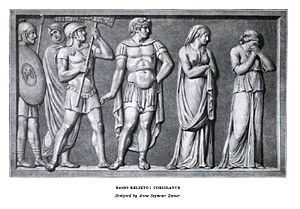 Coriolanus, bas relief (Photo credit: Wikipedia)Not a play to be enjoyed, of course. But certainly one that informs and enlightens regarding the human condition. It’s particularly encouraging that it is the women who finally resolve the situation and prevent the ultimate tragedy for Rome itself, even if not for Coriolanus.
Coriolanus, bas relief (Photo credit: Wikipedia)Not a play to be enjoyed, of course. But certainly one that informs and enlightens regarding the human condition. It’s particularly encouraging that it is the women who finally resolve the situation and prevent the ultimate tragedy for Rome itself, even if not for Coriolanus.A play I’d like to see performed and, as I’m unlikely to find a stage performance in the near future, I can at least arrange to see the film. And I will. As a study of human failing and success, and a description of the fickleness of loyalty and its opposite extreme it packs a powerful punch. If you haven’t read it, I suggest you give it a try.
Related articles
 Coriolanus - Movie
Coriolanus - Movie
 Ellen Terry as Volumina
Ellen Terry as Volumina

Published on April 15, 2013 00:47
April 13, 2013
Beware The Thesaurus.
 The Historical Thesaurus of the Oxford English Dictionary (Photo credit: Wikipedia)
The Historical Thesaurus of the Oxford English Dictionary (Photo credit: Wikipedia)A little while ago, I came across the following statement, made by a professional journalist reporting in the local media: ‘The crash took place…’I won’t bore you with the rest of the details. But, as I’m sure you’ll agree, a crash is an accident and accidents ‘happen’, they don’t ‘take place’. Meetings, concerts, pre-planned events ‘take place’.
This set me thinking about the way in which most writers seek out alternative words and expressions to prevent repetition and dullness and to enliven their work. The bulk of us turn to the thesaurus, whether in book form or online. I use two different versions most of the time: the excellent, short, but useful online program known as WordWeb, which is a free to use application that can be downloaded and associated with your word processor to check for definitions and alternatives for a large number of words. Click here for a link to the download website.
I prefer, however, the much more comprehensive book, The Original Roget’s Thesaurus, in the 1987 edition, prepared by Betty Kirkpatrick. I have alternatives on my shelves: Hartrampf’s Vocabulary Builder, the Oxford Compact Thesaurus, The Slang Thesaurus, The New Nuttall Dictionary of English Synonyms and Antonyms, and A Dictionary of Euphemisms and Other Doubletalk.
The danger with the thesaurus, of course, is rather akin to that posed by the ubiquitous spellchecker on the PC: it depends for its effectiveness on a level of understanding from the user. Spellcheck ‘their’, ‘there’, and ‘they’re’ and all will pass the test with ease. Usage determines the correct spelling. With a thesaurus, it’s essential that the user at least understands what the word actually means.
An example, then.
I suspect the vast majority of readers here will know the word, ‘wanton’. And I guess most would recognise its use as an adjective in the following couple of sentences:
‘She dressed in a manner suggestive of her wanton nature, advertising her readiness to serve any and every man present.’
‘He pulled his partner back to his feet and knocked him down again, before laying into him in wanton violence as the poor wretch lay at his feet.’
Yes, I know; clichéd examples but, bear with me: I wanted samples that gave context to the word in question and in both these ‘wanton’ is easily defined by reference to its usage.
If, however, you were to use an unusual word without such contextual clues, it would be very easy to employ a totally unsuitable alternative simply by consulting a thesaurus. I’ll illustrate what I mean. First, lets’ see how the Shorter Oxford English Dictionarydefines ‘wanton’:
Wanton: (SOED) Adj: Of a person – undisciplined, ungoverned, unmanageable, rebellious, jovial, inclined to joking, carefree, petulant, spoilt, self-indulgent, insolent in triumph or prosperity, reckless, merciless (of a boy) childishly cruel or unruly. Of an animal – skittish, refractory, unmanageable, frisky, frolicsome,. Originally only of a woman – thought, action etc: lustful, sexually promiscuous, flirtatious.Of colour or music – cheerful, livelyOf an object – moving freely as if alive, unrestrainedOf wealth, clothing, diet, a way of life – luxurious, extravagant, Of cruelty or violence – unprovoked, reckless, gratuitousOf speech and imagination – extravagant, impetuous, unrestrained Fastidious or dainty in appetite, profuse in growth, luxuriant.
I suspect there are more meanings here than most readers expected. Some, of course, are now either rare or generally used only in a literary or poetic sense. Nevertheless, the most common usages of the word are buried amongst many other meanings. So, this is a word for which the dictionary provides a number of different meanings, which would only become apparent by context. Already, we have a recipe for potential confusion.
If we now examine the entries in The Original Roget’s Thesaurus for the same word, used as an adjective, we find the following suggestions under their headings:
-changeful:changing, mutable, alterable, phased, changeable, shifting, vicissitudinous, varying, variant, variable, nonuniform, kaleidoscopic, iridescent, protean, multiform, quick-change, versatile, skilful, uncertain, unreliable, vacillating, wavering, irresolute, moody, unpredictable, unaccountable, unexpected, never the same, ever-changing, volatile, mercurial, different, wayward, fickle, whimsical, capricious, giddy, dizzy, flighty, wanton, irresponsible, frivolous, light-minded, shifty, inconstant, unfaithful, disloyal, traitorous, tergiversating.
-capricious: motiveless, purposeless, whimsical, fanciful, fantastic, eccentric, humoursome, temperamental, crotchety, maggoty, freakish, fitful, hysterical, mad, crazy, prankish, mischievous, wanton, wayward, perverse, faddy faddish, particular, fastidious, captious, arbitrary, unreasonable, fretful, moody, contrary, irascible, undisciplined, refractory, wilful, erratic, uncertain, unpredictable, unexpected, volatile, mercurial, skittish, giddy, frivolous, light-minded, inconsistent, inconstant, variable, unstable, irresponsible, unreliable, fickle, feckless, tergiversating, flirtatious, coquettish, playful.
-free: freeborn, enfranchised, heart-whole, fancy-free, unattached, scot-free, acquitted, on the loose, at large, escaped, released, freed, liberated, free as air, free as the wind, free as a bird, footloose, go-as-you-please, ranging, travelling, ranging freely, having full play, licensed, chartered, privileged, permitted, exempt, immune, nonliable, free-speaking, plain-spoken, plain, free-thinking, emancipated, broad, broadminded, latitudinarian, unbiased, unprejudiced, independent, uninfluenced, just, free and easy, all things to all men, sociable, loose, licentious, unbridled, incontinent, wanton, impure, at leisure, out of harness, retired, relaxed, unbuttoned, at home, at ease, leisurely, free of cost, gratis, freebie, on the house, for free, unpaid for, uncharged, unclaimed, going begging, unwanted, free for all, unreserved, vacant, unoccupied, up for grabs, accessible. -rash: ill-considered, ill-conceived, ill-advised, harebrained, foolhardy, wildcat, injudicious, indiscreet, imprudent, unwise, careless, hit-and-miss, slapdash, free-and-easy, accident-prone, negligent, unforeseeing, not-looking, uncircumspect, lemming-like, incautious, unwary, heedless, thoughtless, inconsiderate, uncalculating, inattentive, light, frivolous, airy, breezy, flippant, giddy, devil-may-care, harum-scarum, slaphappy, trigger-happy, light-minded, irresponsible, reckless, regardless, couldn’t-care-less, don’t-care, damning the consequences, lunatic, wanton, wild, cavalier, bold, daring, temerarious, audacious, overdaring, overbold, madcap, daredevil, do-or-die, neck or nothing, breakneck, suicidal, overambitious, over the top, oversanguine, oversure, overconfident, hoping, overweening, presumptuous, arrogant, insolent, precipitate, gadarene, headlong, hell-bent, desperate, hasty, unchecked, headstrong, wilful, untaught by experience, ignorant, impulsive, impatient, hot-bloodied, fire-eating, furious, excitable, danger-loving, unfearing, venturesome, speculative, adventurous, thrill-seeking, risk-taking, enterprising, improvident, thriftless, prodigal.
-unchaste:unvirtuous, vicious, susceptible, not impregnable, frail, fallen, seduced, prostituted, taken advantage of, of easy virtue, of loose morals, amoral, immoral, incontinent, light, wanton, loose, fast, naughty, wild, rackety, immodest, daring, revealing, unblushing, shameless, brazen, flaunting, scarlet, meretricious, whorish, tarty, promiscuous, sleeping around, screwing around, streetwalking, on the game, Paphian, Aphrodisian.
A total of 380 alternatives is presented. True, some are duplicated under the various headings, but there are still many from which the writer may choose. Anyone not conversant with the ways of the thesaurus might be fooled into selecting any one of these words as an alternative to ‘wanton’. And, whilst a great many of them could act as a suitable replacement, there are many which would not do at all.
Let’s try it:
‘She dressed in a manner suggestive of her shifting nature, advertising her readiness to serve any and every man present.’
‘He pulled his partner back to his feet and knocked him down again, before laying into him in coquettish violence as the poor wretch lay at his feet.’
In the female sentence, the woman is now no longer specifically a sexually active creature but someone who accommodates to the needs of the men, perhaps in order to deal with their work requirements.In the male version, the violence has taken a farcical turn, possibly describing a lover’s tiff solved by aggressive coitus.
So, perhaps not the best possible example but one that I hope illustrates the importance of ensuring that you understand the real meaning before substituting one word for another. We don’t, after all, want any tarty violence perpetrated on any free-thinking men, do we? Or, perhaps, we do!
Related articles
 A Full, Offline Thesaurus in Your Pocket to Impress Anyone, Anywhere
A Full, Offline Thesaurus in Your Pocket to Impress Anyone, Anywhere
 Writer resources: dictionary and thesaurus
Writer resources: dictionary and thesaurus
 Tired Phrases? The Remedy is the Thesaurus of Course.
Tired Phrases? The Remedy is the Thesaurus of Course.
 Where to Purchase Roget's Thesaurus, 6th Edition for Less
Where to Purchase Roget's Thesaurus, 6th Edition for Less

Published on April 13, 2013 05:58
April 12, 2013
Macs for Dummies, by Edward C. Baig, Reviewed.

Macs for Dummies, by Edward C. Baig, consists of more than four hundred pages of erudition delivered with humour and easy style. In what could so easily have been a dry and dull presentation, we have here a text book which is readable and enjoyable.
I was gifted the book as part of my retirement present from work colleagues, who knew I was considering the idea of swapping my PC for a Mac, once I’d left employment and could devote more time to writing. So, it was a welcome volume. I read it well out of order in my ‘to read’ list, as I was considering making the change on or around my 65thbirthday, which comes up next month.
Reading a computer manual without benefit of the machine may seem a little odd. But, as Baig makes clear in his introduction, the book is designed as much for that eventuality as for those who have already committed to the Mac. The ready humour and light presentation make the book a delight to read. Packed with information, tips, technical bits (that you can skip if you wish), warnings and short asides into the more esoteric aspects of the Mac world, this is definitely the book to read if you’re either about to make the momentous decision I face or have taken the first step and purchased your first Mac.
I learned, with growing wonder, the huge variety of programs and applications provided with this amazing machine. I learned about the ease and user-friendliness of the operating system, which makes Windows look decidedly clunky (though you can run Windows in parallel, should you so desire). The author explains the similarities and the differences, he describes the hows and whys of various aspects of using the machine and its operating system. Inevitably, there are technical terms, but where these need explanation, he provides it in terms that are easily understood.
The book was published in 2011 and is in its 11thedition. Of course, it was written before this date, so certain things have changed since then. The operating system he describes is the Snow Leopard, but there have been 2 upgrades since then and, as I understand it, we are now on safari with the Mountain Lion OS. So, there are some aspects that are no longer current. But, Baig makes this clear and gives the URLs of several websites to help the reader update, including the specific Mac site that will keep all prospective and current users up to date. It is, of course, inevitable that a book about the fast moving world of computing will be out of date as soon as its writing is complete. But this one makes a serious attempt to compensate for that by both flagging likely changes and providing the means to address them.
So, the questions arise; have I made the decision and did the book in any way influence me?
To the first, the answer is YES, I have and, I’m impatient to buy my first Mac. I will, however, wait until my birthday, as I’m currently learning to touch-type (my 2 fingers and thumb technique restricts me to a maximum speed of 45 wpm, and I need to be able to type at a speed at least close to my thoughts) and I think one new skill is enough for a man of my decrepitude. But I look forward to that change with real enthusiasm.
To the second, the answer is, once again, YES. I had conversed with users and heard their enthusiasm and universal praise, so I was ready to be convinced. But I had not, until I read this book, fully appreciated the sheer wonder of the Mac, its hardware and software and the marriage made in heaven between those two elements. The sheer variety and relevance of the vast array of applications makes the difference in price between the Mac and the PC more or less irrelevant and renders the happy coupling of hard and software a bonus. I look forward to using the new Mac to produce my masterpieces in the very near future. If you’re unsure whether you should make the change and you consider yourself a serious author, graphic artist or photographer, I seriously suggest you spend the few pounds this book costs and then decide for yourself, armed with the facts.Related articles
 Memory Clean: Free Mac Application Review
Memory Clean: Free Mac Application Review
 Q&A: MacFixIt Answers
Q&A: MacFixIt Answers
 How to prepare your Mac for Mountain Lion
How to prepare your Mac for Mountain Lion

Published on April 12, 2013 02:45
April 5, 2013
In Search of the Wild Asparagus, by Roy Lancaster, Reviewed
 Based on the original Granada TV series, which I never watched, this charming book details the natures, habitats and properties of many of the wild plants growing in the UK. Perhaps this seems an odd book for a writer. But it’s a wonderful source of local detail for stories. Sometimes, the very mention of a specific plant can inject extra atmosphere into a story. Think of the plant poisons that have been used during the ages and the wonderfully evocative descriptive role of plants like waving marram grass on windblown seaside sand dunes, pricking thistles or stinging nettles in the path of fleeing, scantily clad beauties, reeds softening the edges of broads and rivers where poachers or smugglers hide.
Based on the original Granada TV series, which I never watched, this charming book details the natures, habitats and properties of many of the wild plants growing in the UK. Perhaps this seems an odd book for a writer. But it’s a wonderful source of local detail for stories. Sometimes, the very mention of a specific plant can inject extra atmosphere into a story. Think of the plant poisons that have been used during the ages and the wonderfully evocative descriptive role of plants like waving marram grass on windblown seaside sand dunes, pricking thistles or stinging nettles in the path of fleeing, scantily clad beauties, reeds softening the edges of broads and rivers where poachers or smugglers hide.Clearly not a book from which every detail can be taken and used at once. But a volume to return to for the many interesting facts that Lancaster places before the reader. The local names bring character and humour. The properties, both medicinal and nutritional, could be effective in many science fiction settings or in historical novels. Merely knowing that certain plants are likely to inhabit specific habitats is sufficient to make those imagined locations more real.
 English: Sand Dunes by East Beach Some areas are more densely covered in marram grass than others, and are thus better able to resist erosion by the wind. (Photo credit: Wikipedia)Written in a casual, friendly style that reflects the author’s enthusiasm, not to say passion, for the subject, the book is an easy read in spite of the vast amount of detailed information that’s given. It had me recalling early walks with my father, an expert on butterflies and birds but without any knowledge of plants. It also created nostalgia for a holiday spent in Germany, where my wife’s old landlady provided the German names of common plants and I was able to compare them with those I knew from home. An entertaining walk that highlighted the similarities to be found between nations.
English: Sand Dunes by East Beach Some areas are more densely covered in marram grass than others, and are thus better able to resist erosion by the wind. (Photo credit: Wikipedia)Written in a casual, friendly style that reflects the author’s enthusiasm, not to say passion, for the subject, the book is an easy read in spite of the vast amount of detailed information that’s given. It had me recalling early walks with my father, an expert on butterflies and birds but without any knowledge of plants. It also created nostalgia for a holiday spent in Germany, where my wife’s old landlady provided the German names of common plants and I was able to compare them with those I knew from home. An entertaining walk that highlighted the similarities to be found between nations.I’ll keep the volume on hand, along with my other ‘research’ books, on the shelves beside my desk. Easy access to such knowledge is vital for the writer. For those who don’t write and for whom reading is the most essential aspect of a book, I can say that this one will entertain, educate and amuse. Split into different sections to explain the flora of various locations, it brings life and light to a subject that might otherwise be seen as dry or essentially academic.
I enjoyed the read. For anyone with any interest in the countryside and with that sort of curiosity that seeks to know more about the world about them, this is a valuable aid. It’s now over 30 years old, but still relevant, and still available. I happily recommend it.
Related articles
 Wild Asparagus
Wild Asparagus
 The Wild Asparagus of Croatia: A Foraging Trip & Lunch in the Dalmatian Countryside
The Wild Asparagus of Croatia: A Foraging Trip & Lunch in the Dalmatian Countryside

Published on April 05, 2013 06:43
April 2, 2013
The End of an Old Life and the Start of a New One.
 I write this in the new role of full time writer. Officially, my retirement starts on 5th April and my 65th birthday isn't until next month. But, for reasons I won’t bore you with, I finished employment on 21st March. Last week was supposed to be a holiday, to ease the passage from one stage to another. However, outside events intervened and I spent some of that in hospital and much of the time since in recovery. The knee’s progressing well and I’m now able to walk unaided for short distances.
I write this in the new role of full time writer. Officially, my retirement starts on 5th April and my 65th birthday isn't until next month. But, for reasons I won’t bore you with, I finished employment on 21st March. Last week was supposed to be a holiday, to ease the passage from one stage to another. However, outside events intervened and I spent some of that in hospital and much of the time since in recovery. The knee’s progressing well and I’m now able to walk unaided for short distances.It’s been a mixed month: emotionally demanding. In spite of the fact that I was eager to finish my time as an employee, the conditioning we receive from society confers the role of breadwinner on most men and entrenches that expectation, so I experienced some muddled emotions. The turmoil was short-lived. I shall continue to be the provider, but using pensions instead of wages. And, now I have the freedom, my writing will contribute to my earnings more than it has.
What was intended to be a short period of relaxation, to allow me to settle into retirement, turned out to be a physically demanding period in the hands of skilled and caring medics. I chose to have the operation under local anaesthetic, as previous experience with general anaesthetics has caused violent vomiting; something I prefer to avoid. Also, being able to witness the procedure allowed me to collect further experiences for my writing.
 English: Right knee. (Photo credit: Wikipedia)I managed to give the anaesthetist a bit of a problem. My blood pressure was textbook but my pulse rate rather slow (much to my pleasure, he compared it to that of an athlete). The spinal anaesthetic has the effect of fooling the heart into believing that the lower half of the body has lost interest in receiving blood, so the pump slows down. In my case, rather too much, so that I began to faint. Oxygen and an injection of some stimulant soon had me performing normally again. For associated reasons, however, I began to shiver with cold as my core temperature dropped a couple of degrees in the air-conditioned theatre. That was readily cured by the use of an inflatable blanket attached to its own supply of hot air (something I can generally provide without difficulty). I was kept wonderfully warm throughout.
English: Right knee. (Photo credit: Wikipedia)I managed to give the anaesthetist a bit of a problem. My blood pressure was textbook but my pulse rate rather slow (much to my pleasure, he compared it to that of an athlete). The spinal anaesthetic has the effect of fooling the heart into believing that the lower half of the body has lost interest in receiving blood, so the pump slows down. In my case, rather too much, so that I began to faint. Oxygen and an injection of some stimulant soon had me performing normally again. For associated reasons, however, I began to shiver with cold as my core temperature dropped a couple of degrees in the air-conditioned theatre. That was readily cured by the use of an inflatable blanket attached to its own supply of hot air (something I can generally provide without difficulty). I was kept wonderfully warm throughout.The most surreal aspect of the experience was seeing the surgeon lift a leg that was mine, but appeared to belong to someone else, so convinced was my body and brain that it remained flat on the table. Extraordinary!
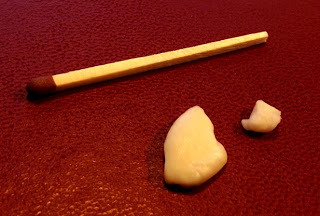 The offending intruder in the joint (matchstick for scale)Watching the images from the camera as it toured my knee joint was fascinating. The obstruction, a piece of bone about the size and shape of an unshelled almond, was located fairly early in the procedure. But the normal route of extraction turned out to be unsuitable, so a third incision was made to give better access and, after 40 minutes on the slab, the offending invader was removed. The surgeon showed me the hole, at the rear of the patella, where the piece of bone had once resided, evident even 19 years after the incident that caused the injury. He cleaned up the rough and damaged surfaces of the cartilage within the joint and on the back surface of the knee cap, flushed out the other small bits of detritus, and sewed up the wounds.
The offending intruder in the joint (matchstick for scale)Watching the images from the camera as it toured my knee joint was fascinating. The obstruction, a piece of bone about the size and shape of an unshelled almond, was located fairly early in the procedure. But the normal route of extraction turned out to be unsuitable, so a third incision was made to give better access and, after 40 minutes on the slab, the offending invader was removed. The surgeon showed me the hole, at the rear of the patella, where the piece of bone had once resided, evident even 19 years after the incident that caused the injury. He cleaned up the rough and damaged surfaces of the cartilage within the joint and on the back surface of the knee cap, flushed out the other small bits of detritus, and sewed up the wounds.Once out of the recovery suite, I was wheeled back to my private room (this is the NHS so such luxury is a treat) and fitted with a surgical stocking to match the one on my ‘good’ leg. These help prevent the dreaded deep vein thrombosis that can afflict older patients, especially following surgery on the legs. As an added precaution, I was provided with five pre-packed injections of anti-coagulant and shown how to inject the first of these into my stomach so I could do the rest over the following days.
The medical aspects done, I had to drink (something I was very ready to do), eat, and pass urine before I could be released. By late afternoon I was free for my wife to take me home. The anaesthetic began to wear off during the journey and I understood I was in for a period of pain, of course.
Subsequent days have seen me hobbling and then walking with the aid of my father’s old walking stick. Yesterday, I managed about 1 mile, so I’m clearly well on the road to full recovery. Now looking forward to longer walks in the wonderful Yorkshire Dalesand bike rides around the local countryside.
You’ll understand that the month hasn’t been what could be called a ‘regular’ period of time, especially as the Easter holiday intervened. I’ve also begun the touch-typing lessons I alluded to in a previous post. So far, I can manage asdfghjkl; and am now starting on t and y. I’ve discovered I have to do the exercises in short bursts as my fingers ache at present. This, of course, will reduce as I become used to the movement. One other thing I’ve noticed is how sensitive the keys are. Last time I tried touch-typing it was on a manual typewriter and required considerable force to move the keys. Different technique required. But it’ll be worth the effort and time to increase my 2 finger, 1 thumb speed above its current 45 wpm. And, of course, I’ll be able to copy type, without looking at the keyboard as I do now.
At last, then, to the chart. You’ll note that a significant part of the month has been spent reading, which is hardly surprising, given the above. I managed some writing: reviews, blog posts and a short story. Did some editing; the epic fantasy, short stories, blog posts etc. A great deal of internet research, largely in preparation for the future, and much work done under the catch-all label of ‘Admin’, which includes the typing lessons and the conversion of some textual quotes into tweets. The contests page has been updated a couple of times, and that’s always time consuming. Needs doing again, of course. But I failed utterly in the submissions department. Not a single story sent to either contest or magazine. I intend to correct those omissions in the coming weeks. And, of course, I’ll be doing more real writing from now. That, of course, is the exciting stuff.
A longer piece than envisaged when I began, but I thought my experience might help those who face similar interventions. I hope so, anyway.
How did you do during this third month of the year? Hit your targets, increased your output, experienced anything new? Let us know and share it with us here.
The pie chart, explained: 'Writing' - initial creation of stories, blog posts, reviews and longer works.'Editing' - polishing of all written work to make it suitable for readers.'Research' - discovery of info for story content, market research, contests and blog posts.'Reading' - books and writing magazines.'Networking' - emails, Twitter, Pinterest, Facebook and Google+ activity.'Admin' - story submission, blog posting, marketing, organisation and general admin tasks.

Published on April 02, 2013 03:57



